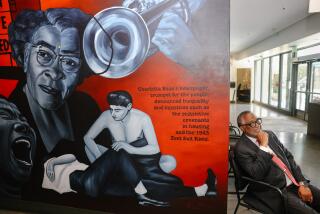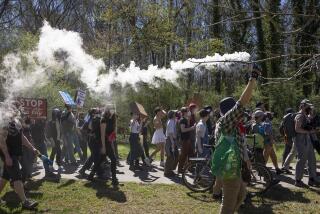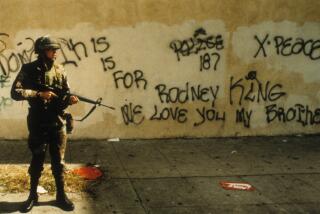In Postwar ‘Dodge City,’ Soldiers Now Deputies
- Share via
BAGHDAD — The good citizens of the Jadriah neighborhood dumped the corpses of two looters on a weed-infested bank of the Tigris River. The young men had tried to shoot their way into one of the upscale riverside houses here Sunday night and were gunned down by the homeowner.
That, at least, was the story told to a U.S. Army scout patrol that passed by Monday morning.
“It’s Dodge City out here,” Hashim Mahmood, an American-educated civil engineer, told Sgt. 1st Class Michael Anslinger as the soldier stepped from his armored Humvee. “There are guns everywhere.”
Barely 30 minutes into the patrol, Anslinger found himself with two bloated corpses to dispose of, a crowd of agitated homeowners and packs of gun-toting looters. And this was just the scouts’ first full day in a patrol zone nearly doubled in size by the withdrawal of Marines from the east bank of the Tigris over the weekend.
With the capital’s police force poorly equipped and scattered, the scouts and scores of other U.S. soldiers are now serving as ad hoc cops, trying to preserve some semblance of order in Baghdad. They break up fights, shoo away looters, keep watch on the streets and pursue anyone who fires in their direction.
They also deal with the dead. “Looks like 7.62 [millimeter] rounds. Good shots. They went right through the belly of one guy and the upper body of the other,” Anslinger said of the corpses after arranging for their removal by combat engineers.
But mostly, the scouts listen patiently to complaints about the lack of electricity and running water and the profusion of snipers, looters and fires.
Mahmood, standing in front of his stucco home overlooking the Tigris, complained in flawless English that looters from poor neighborhoods were flooding into his upper-class district of doctors, lawyers and engineers. The interlopers were hauling away carpets and jewelry and moving into the sumptuous homes abandoned by Baath Party officials who once lived here, he said.
The looters shoot wildly at night, Mahmood continued, and threaten to kill anyone who confronts them. To protect the homeowner who shot the two looters, he said, residents spread the word that they had been killed by U.S. soldiers.
Capt. Stefan McFarland, the scout leader, listened politely to Mahmood’s litany of indignities.
“We’re trying to prevent just this sort of thing,” McFarland said. “That’s why we’re here.”
A psychological operations officer handed Mahmood a handful of leaflets urging Iraqis to stop looting to speed the arrival of humanitarian aid. Mahmood gave a dismissive look. “No one will listen to this,” he said.
A half-block away, several young men were hauling a bathtub across the road. They had just ripped it from the floor of a Baath Party guest house, which residents said Saddam Hussein’s son Qusai had frequented. The neighborhood was also home to Hussein’s half brother Watban and to Izzat Ibrahim, vice chairman of the Baath Revolutionary Command Council, residents said.
A U.S. bomb had destroyed a portion of the guesthouse. It also damaged part of the adjoining home of Dhia Jaffer, a lawyer, who complained that his residence had been looted.
“The Americans did a good thing, and we are very happy with the results,” Jaffer said. “But now we need law and order and security.”
Mahmood put it more bluntly: “We thank you Americans for liberating us from Saddam Hussein, but now people are crying for the security we had under Saddam.”
As the residents spoke, two off-duty Iraqi policemen wandered over to eavesdrop. They were dressed in green uniforms with epaulets that made them look like soldiers, and some of the scouts tensed for a moment. At a meeting the night before, scout leaders had been cautioned not to mistake Iraqi police for soldiers.
The U.S. military is eager to turn over policing duties to Iraqis. U.S. commanders say they will supply Iraqi police officers with sidearms confiscated from Iraqi military caches and blue uniforms. Small numbers of police began limited patrols with U.S. forces this weekend.
Civil affairs officers say they hope to have 1,000 police on the streets in three weeks at salaries of $2.40 per day. They plan to have 5,000 officers on duty within two months.
Until then, the scouts, who are part of the 4th Battalion, 64th Armored Regiment, 3rd Infantry Division, and other American units will be responsible for law and order. Their rules of engagement do not permit them to shoot looters unless they are directly threatened.
On Monday, McFarland assessed the situation in Jadriah: “The haves are trying to hold on to what they have, and the have-nots are trying to take it.”
One of the haves, Dr. Ali Faraj, a cardiologist, stood before his well-appointed home and mentioned that he has hired two armed guards. “This is a well-to-do area of educated professionals, at least until these people started pouring in,” he said, gesturing toward knots of looters.
Nasir el Arfali, a building contractor, rattled off what he said armed looters had stolen from his home Sunday night: carpets, five air conditioners, jewelry, paintings, gold coins and his TV set. “And they shot all the windows,” he said, stooping to pick up a spent AK-47 cartridge.
Ganim Mahmood, a civil engineer, complained that lower-class Iraqis have abused new freedoms. “They think freedom means freedom to loot,” he said.
Mahmood said his home had been looted and gutted. “Give me your machine gun for a little while,” he joked to a soldier after a shot rang out nearby.
Hashim Mahmood, Ganim’s brother, produced a letter signed by a Marine major and addressed to “Any U.S. military personnel.” It noted that Mahmood was a “an influential member” of the neighborhood. Mahmood also showed a yellow card provided by the Marines as proof of his status as a sort of unofficial neighborhood watch captain.
McFarland said he thought Mahmood was doing his best to keep the situation from exploding. But he intended to have civil affairs check him out anyhow. He was leery of any well-heeled Iraqi living in a Baath Party neighborhood -- even one who claimed to have lived in the U.S. and earned a degree from the University of Toledo.
The captain did not intend to kick squatters out of houses, as the Mahmood brothers requested. Nor would he issue neighborhood watch cards.
“That’s a cop’s job,” he said. “I can’t run this country for these people. These guys, they want, want, want. We just want to maintain our presence and to try to help them help themselves.”
The scouts did agree to Hashim Mahmood’s request to drag heavy concrete blocks across a driveway the looters had used to load up vehicles. Mahmood had someone paint a sign in Arabic that read: “Official Military Checkpoint for U.S. Army.”
It was a lie, but worth trying. And anyway, the captain promised to patrol the area regularly, beginning Monday night.
Mahmood thanked them and stared at the sign. “I wish I was back in the States now,” he said.
More to Read
Sign up for Essential California
The most important California stories and recommendations in your inbox every morning.
You may occasionally receive promotional content from the Los Angeles Times.














